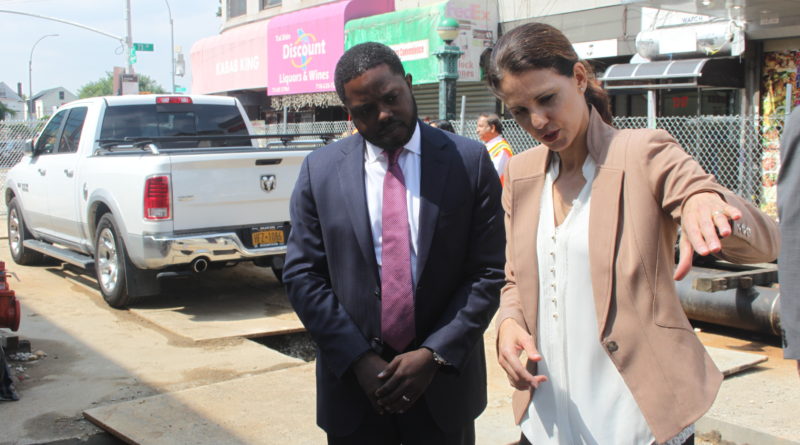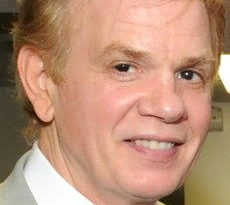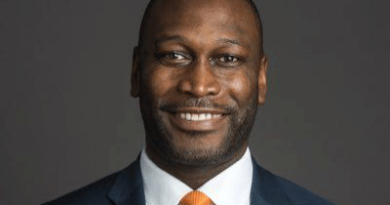Diversity Plaza project highlights MWBE impact
By Benjamin Fang
As the de Blasio administration strives to reach its goal of awarding 30 percent of city contracts to women and minority-owned business enterprises (MWBEs), city officials are highlighting projects led by these small businesses.
Last Thursday at Diversity Plaza in Jackson Heights, Jonnel Doris, director of the Mayor’s Office of Minority and Women-owned Business Enterprises, and Ana Barrio, acting commissioner of the Department of Design and Construction (DDC), toured a reconstruction site.
The $4.45 million project will bring new trees, raised planters, chairs, tables and bike racks to the popular gathering spot. Nearby streets will be resurfaced and new water mains, catch basins, sidewalks, curbs, street lighting and traffic signals will be added.
The project is expected to be completed by July 1, 2018.
“The community congregates here, ghe community is really here 24 hours a day,” said Karine Williams, president of Akela Contracting, which is leading the project. “There were vigils the other night when we came to work for Hurricane Harvey. Tables and candles were set up around the perimeter.”
Williams, whose firm is a certified women-owned business, said the project was perfect for her company because of its location and scope. She said the project size and design were appealing.
“I was able to just have one crew work here, I didn’t have to go and hire outside of my current workforce,” she said. “It’s pretty self-contained, it was manageable for me.”
Williams started her company in 2009, but only worked on it part time. She decided to go into the construction industry full time in 2013, despite her background in business.
“The challenge of doing a different type of business is still exciting. It changes all the time, every project is different,” she said. “I find that very exciting. People should not be discouraged to try new things, as long as you have the heart to do it and you’re willing to see it through.”
She said the process to apply for a city contract was initially difficult because of the paperwork. But when Williams was the lowest bidder for the project, she was assigned a contract manager to help her navigate the process.
“They walk you through the process step by step,” she said. “It eliminated a lot of uneasiness with dealing with the city.
“For any women or minority-owned or small business that is trying to grow and play with the big boys, there’s a lot of challenges there alone. The competition is not on a level playing field,” Williams added. “But the more you keep at it, one day you will get it. You swing at enough balls, eventually you’ll hit one.”
The benefit of a city contract, Williams noted, is that contractors are paid on time and receive resources to help complete the project.
“You can be confident going in that you won’t have to close your business because you can’t finish,” she said. “The city is really there, they want you to succeed as much as you want to succeed.”
Doris said his office works to build the capacity of these companies through city programs. The goal is to train and prepare them to apply for city contracts.
“Part of our job as an office is to be an ombudsman for these types of businesses,” he said. “We’re a one-stop shop to assist them and work with them about city contracts and how to navigate that process.”
For example, the Department of Small Business Services (SBS) hosts a “Selling to Government” class where MWBEs learn about the procurement process and best methods when applying for a contract.
Doris noted that city contracts are “an open, competitive process.” It’s illegal for the city to just set aside a project for MWBEs. But to address the disparities, the office was established to encourage inclusion within the bidding process.
The Department of Design and Construction (DDC), which oversees the Diversity Plaza project, awarded $570 million in contracts to MWBEs last year alone, representing a 300 percent increase over three years.
“MWBEs are an important part of the contracting community,” said Barrio. “We want our contracts to represent what New York City is all about, from the smaller firms to the big firms.”
Barrio emphasized the importance of sustainability in their bidding process.
“We don’t want to work with one MWBE and not see them ever again,” she said. “We want them to grow and bid on projects that are bigger for the city.”
When asked how the city can help MWBEs even more, Williams said she would like to see smaller, more attainable projects for the smaller firms.
“Not everyone can do a $10 million job,” she said.
Doris added that’s part of his office’s effort, to break up contracts, particularly with city agencies, so qualifying MWBEs can compete.
“We’re very excited about what’s happening in Queens. If you look at Diversity Plaza, it’s really a testament to what New York City is all about,” he said. “To have an MWBE actually doing the work in Diversity Plaza, you can’t beat that.”




